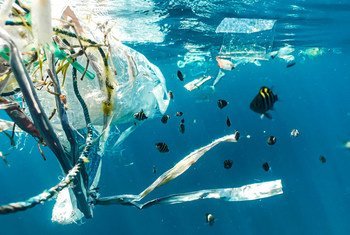In 2022, geopolitical divisions threatened peace and stability, conflicts erupted and countries continued to grapple with worsening climate emergencies, soaring poverty and deepening inequalities as the COVID-19 pandemic reversed progress in human rights, said UN High Commissioner for Human Rights Volker Türk during the presentation of the Annual Report of his office.
Despite the myriad of crises that defined 2022, UN Human Rights continued to be a formidable ally to those fighting for justice and equality, and against human rights abuses and violations.
“Our report for 2022 demonstrates how valuable this work is — with benefit not only in specific countries, but as a major contributor to safeguarding global stability, promoting development, and paving the road to peace,” Türk said.
In his first annual report since he began his tenure as High Commissioner in mid-October 2022, Türk laid out the impact of UN Human Rights’ work across a wide range of issues, including preventing human rights violations, addressing discrimination and inequalities, and supporting victims and accountability for the perpetrators of human rights abuses.
Key achievements
For example, UN Human Rights supported Montenegro in adopting a new strategy to protect people with disabilities. Through its advocacy, it also contributed to the Disabilities Act coming into effect in Jamaica. And in North Macedonia, it provided advice on drafting the Gender Equality Law, which recognizes diverse gender identities for the first time.
UN Human Rights also worked to prevent human rights violations in law enforcement and justice systems, and contributed to the abolition of the death penalty in the Central African Republic, Equatorial Guinea and Zambia.
At the global level, it supported the establishment of the International Independent Expert Mechanism to Advance Racial Justice and Equality in Law Enforcement. This body examines laws, policies and practices regarding use of force by law enforcement, and recommends steps to address discriminatory and excessive use of force, as well as other human rights violations against people of African descent.
“The UN exists to prevent crisis and conflict, while advancing justice. Human rights is the best prevention tool we have. Without it, there can be no enduring peace and no sustainable prosperity.
“UN HUMAN RIGHTS CHIEF VOLKER TÜRK
Türk also said that in 2022 his office focused significant efforts on ensuring legal and social frameworks for the protection of women and girls. In Libya, UN Human Rights supported the drafting of the new Law on Violence against Women. It also assisted national authorities in Guinea in the investigation and prosecution of sexual violence crimes, a landmark in the long quest for justice of more than 100 women and girls who were sexually assaulted at the Conakry Stadium massacre in September 2009.
Accountability and justice
Supporting victims of human rights violations, grants provided by the Voluntary Fund for Torture and the Trust Fund on Contemporary Forms of Slavery assisted over 46,000 victims of torture in 2022, and 13,000 survivors of slavery around the world.
In Ukraine, UN Human Rights is playing a crucial role in helping collect information regarding evidence of gross violations of international crimes. This evidence will help to shape future efforts for accountability and justice for victims.
More than 100 field presences
Responding to the vast need to protect human rights, UN Human Rights has become increasingly operational, Türk noted. Since its creation 30 years ago, the Office has built a global team of 1,841 people working across more than 100 field presences and headquarters.
In 2022, UN Human Rights established an Emergency Response Team in Fiji, the seventh such team stationed across the globe. To strengthen the human rights response to other crises, UN Human Rights sent surge teams to Bosnia and Herzegovina, Burkina Faso, Chad, Gabon, the Gambia, Haiti, Kazakhstan, Kenya, Kyrgyzstan/Tajikistan, Peru, São Tomé and Príncipe, Tunisia and Ukraine.
“But we need to do more. We need more people on the ground to prevent human rights abuses, so the world does not have to deal with more catastrophic fall-out later,” he said.
“We need to double our budget”
In 2022, UN Human Rights received slightly more than $392 million in regular and voluntary contributions. However, Türk stressed that as the leading global entity on human rights his office needed to double its budget in order to deliver its mandate in a world facing increasing threats to human rights.
“If we had the assurance of predictable, flexible multi-year funding, we see many places in the world where we could and should be doing much more, including in the area of economic, social and cultural rights,” he said, adding that despite being one of the UN’s vital pillars, the overall approved amount that his office will receive in 2023 is just over five percent of the UN’s regular budget.
This year, UN Human Rights commemorates the 75th anniversary of the Universal Declaration of Human Rights, one of the most pivotal documents in modern history. Türk called on the world to use the anniversary to help revitalize the Declaration’s promise of human rights for everyone.
“Standing up for human rights — preventing abuses, ensuring respect, getting justice for victims — is not optional.”





 engthen our healthcare system and help provide more Canadians with the high quality care they deserve,” he said.
engthen our healthcare system and help provide more Canadians with the high quality care they deserve,” he said.










